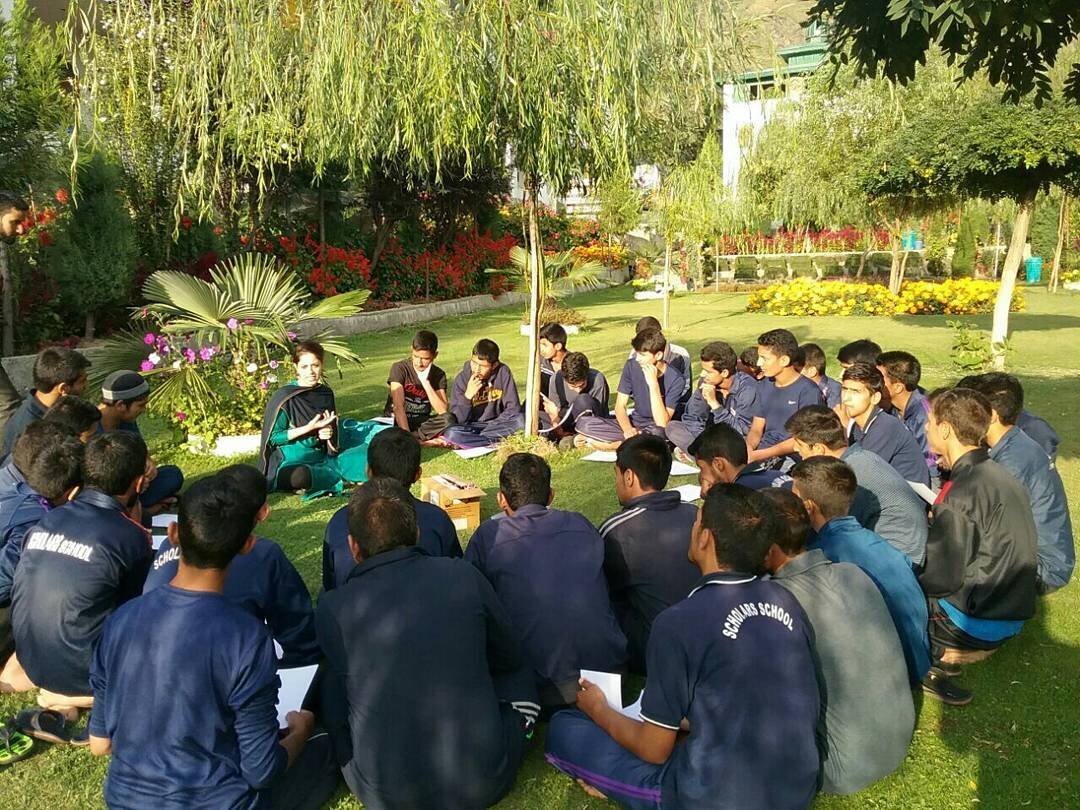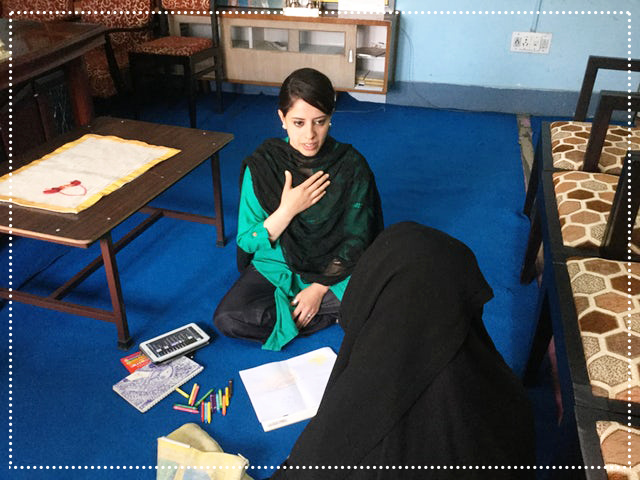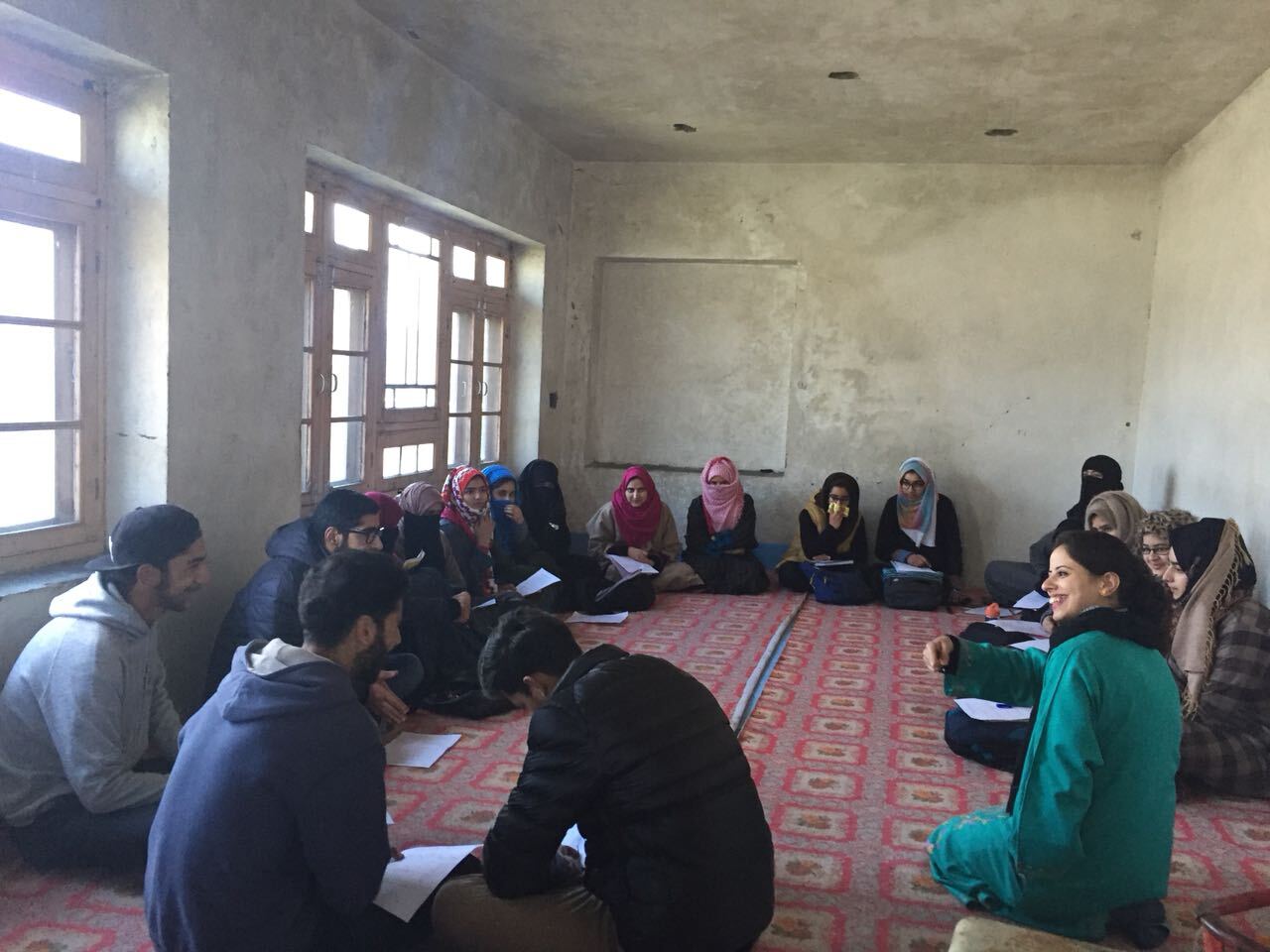One Alum’s Work As The First Peace-Psychologist in Kashmir
.JPG)
Having graduated from UWC Mahindra College in 2007, Ufra has gone on to become the first and only peace-psychologist from Kashmir and South Asia. Working at the intersection of psychology and peacebuilding, Ufra’s vision is centred around positive peacebuilding with holistic wellbeing, mental health, self-transformation, changemaking, inner peace and empowerment forming the core of her work. In turn, it is her belief that these core principles will help people build a more peaceful, cohesive, empathetic, just and resilient world. As Ufra explains: “my work is aimed at impacting individuals and communities - to help them heal and cope positively with the ramifications of living in any conflict situation or zone, building more resilience and space for positive peacebuilding in the process.”
In the past decade, Ufra has worked in Kashmir, different parts of India, South-Asia and the USA, and with people of all age groups and backgrounds. She has received recognition from international forums including the World Economic Forum’s Global Shaper Hub, Nobel Peace Prize forums, The Clinton Global Initiative and has been invited as a TedxSurat Speaker and as a speaker at the UN Women conference. She is also the Founding Executive Director of Paigaam and the International Center for Peace-psychology, an NGO where her focus is on working with international academic institutions and organizations on research, advocacy, education and practice related to peace-psychology. It carries the motto: "Transform Thinking, Transform Lives". Ufra is currently working in Myanmar in the global peacebuilding, psychosocial support and peace-education context. Ufra shares her reflections with us on her journey so far, how she ended up in the field of peace-psychology, and the difficulties she continues to face as a woman working in peacebuilding in and outside Kashmir.
I am from Kashmir. UWC happened to me very serendipitously. I applied when I saw its advertisement in a newspaper, and I was accepted as the first Kashmiri to attend a UWC - without knowing or expecting much from the journey ahead. I had gone there thinking I would pursue my dream of becoming an astronaut. But it was at UWC that I received my first training in conflict resolution skills as a teenager, along with taking psychology for the first time. It was also where I started asking myself bigger questions about my identity as a Kashmiri Muslim girl.
I felt privileged, having received a generous full scholarship to study there; and having the chance to live out in practice what peace, diversity and creating space for different people, ideas and perspectives really means. I wanted to take these experiences back to my own community and into the wider world. It was a difficult but transformative journey and I left as an idealistic changemaker and future leader. UWC prepared me for the worst things in life - helping me create a practical vision for my passion of peacebuilding and wellbeing, giving me a safe space to start the process of translating my pain and fears into constructive ideas and goals, for myself and others.
UWC was also where I first started seriously thinking about peace-psychology. Being Kashmiri-born and having been brought up in a conflict zone; bloodshed, human rights violation and violence came to be the norm. And then at UWC, the critical thinking, the diverse dialogue on varied difficult topics, the freedom to express and be, learning from different people and cultures, the reflections on deep issues – all of this impacted my existence deeply: physically, emotionally, spiritually. It helped me grow, to learn and unlearn, and to be who I am today. It helped me pursue my belief in human rights, justice and positive peacemaking, and empowered me to take action.
I started writing proposals for youth empow erment initiatives in Kashmir, exploring how education can be a way to unite, help and heal people; and kept pursuing it when I went abroad for further studies. And then slowly, with the help of professors and mentors who believed in my unconventional passion for peace-psychology, I started developing my techniques, founded my own Nonprofit (Paigaam) instead of accepting the job offers I received and soon had small initiatives in East-Timor, Uganda and Pakistan, exploring different aspects of peace-psychology. Paigaam is now functional in Kashmir and has today also evolved into an International Center for Peace-psychology. I have been continuously providing free general guidance, coaching and psychological first aid, emotional wellbeing support and basic mental health-psychosocial support to people in Kashmir and globally, online and offline for a decade now.
erment initiatives in Kashmir, exploring how education can be a way to unite, help and heal people; and kept pursuing it when I went abroad for further studies. And then slowly, with the help of professors and mentors who believed in my unconventional passion for peace-psychology, I started developing my techniques, founded my own Nonprofit (Paigaam) instead of accepting the job offers I received and soon had small initiatives in East-Timor, Uganda and Pakistan, exploring different aspects of peace-psychology. Paigaam is now functional in Kashmir and has today also evolved into an International Center for Peace-psychology. I have been continuously providing free general guidance, coaching and psychological first aid, emotional wellbeing support and basic mental health-psychosocial support to people in Kashmir and globally, online and offline for a decade now.
For me, peace-psychology is an empowering, empathetic, sustainable, transformative and multidimensional approach, making peace and healing possible at different levels in order to make a positive difference in wider society. I design and facilitate my own eclectic peace-psychology module mainly through experiential workshops utilising the modalities of mental health, leadership development, conflict reconciliation, critical-creative thinking, empathy and emotional-wellbeing, among others. I also like using various methods from the expressive arts to help people heal, and to transform and express their pain in creative ways, thus empowering them to take charge of their own narratives, build better resilience and explore more constructive ways to cope with the ramifications of living in conflict zones and situations. I believe this approach is a unique way of understanding humans in their contexts and helping them to heal sustainably - not just survive, but grow with more useful skills and techniques.

It hasn’t all been easy though. Being the first and only peace-psychologist from Kashmir and South Asia, it’s been extremely difficult to work without a proper support and mentorship system. This has especially been the case since I moved back to Kashmir, a Muslim-conservative conflict zone, where peace, like many other things, can be seen as controversial. The society is marred with extremism, violence, complex conflict and crisis, and there still aren’t many safe spaces for a woman with ideas. That’s been my biggest challenge, as well as my greatest learning opportunity.
As a woman in Kashmir, I have to be mindful of where I go, who I meet, when I schedule my meetings – all of this impacts one’s space to create, explore and experiment. In a conflict zone that is a heavily patriarchal one, making a firm decision to choose an unconventional career path or fighting many societal pressures (including marriage at a certain age) and traveling around the globe alone for work while I also take care of my family – all of this has never been easy. Additionally, the field of peacebuilding remains a very male-dominated one, so gender bias even in some very ‘intellectual’ spaces here has been quite common. It's not unusual for people to still box me into the identity of a ‘counselor’ for example, because it's easy to see a woman in that space, stereotypically (even though mental health is only one aspect of my work). In a place that has its set standards for anyone, especially women, choosing to live life on your terms, with dignity, is a daily challenge. But I’m a dreamer, operating from a place of passion and the need to serve and contribute meaningfully to society. It’s been difficult to keep my passion, profession and purpose in life as one; but in order to set an example, one has to be an example - and despite many financial, societal, political and professional struggles, I continue to believe in positive changemaking and transformation, and in what I do every single day.
 My work with youth, children and women inspires me the most. Many of them live difficult lives - financially, psychosocially, due to loss of family members, economic hardships, increasing drug abuse, mental health crises and other issues in the valley. You see some of these women on roads protesting for their rights, reclaiming the public space at times; other times, they are striving to earn a livelihood through creative ways. Their resilience, their will to choose to survive is one of the most revolutionary things I see on a daily basis. Their courage inspires me to go on despite daily challenges.
My work with youth, children and women inspires me the most. Many of them live difficult lives - financially, psychosocially, due to loss of family members, economic hardships, increasing drug abuse, mental health crises and other issues in the valley. You see some of these women on roads protesting for their rights, reclaiming the public space at times; other times, they are striving to earn a livelihood through creative ways. Their resilience, their will to choose to survive is one of the most revolutionary things I see on a daily basis. Their courage inspires me to go on despite daily challenges.
I often ask myself if the work I do is meaningful and contributing to positive change or impacting lives positively. I have seen glimpses of transformation happening in front of my eyes, with children, youth, women, who have stayed in touch with me all these years. Seeing how this work impacts them positively, motivates me to keep going. Being a catalyst in other’s journeys of pain, healing, hope, vulnerability, trust, peace, chaos, transformation – is humbling to me. People in their 50’s in just a one or two-day workshop have shared how they feel some calm – how they are able to understand pieces of themselves for the first time in life, crying with gratitude to experience themselves so closely. I have at times been the first person to listen to someone’s story of psychological pain and suffering due to the conflict. All of this is precious to me and keeps me grounded.
And what have I learnt from all this? I have learnt that changemaking, peacebuilding, transformative work, doesn’t happen overnight. Peace is a process, not a product. It can take years, sometimes generations, and it necessitates constant belief, perseverance, patience and self-empathy; but it needs action today and every day. Changing systems, behaviors and attitudes is not easy. But yes, doable. And it all starts with us first. We can only change ourselves and with that, through our responses, thinking, dialogue, we allow ripples of sustainable transformation to take place. None of this is possible without constant conscious reflection and the decision to learn, unlearn and empathize, every single day. Taking personal accountability for our actions and collaborating with others, is a very practical and important approach to doing anything useful in the world today. When we all can acknowledge and accept our differences, and feel united in diversity, that’s when magic happens and we together are able to create a space for a more just, peaceful and inclusive world to unfold and sustain in front of our eyes.
I have seen this happening in some ways, in some places; and I believe with empathy, imagination and critical thinking, we all can make it happen, again, everywhere. We must. The world, especially after this pandemic, needs us to reflect more and create a new kinder, inclusive world together that has space for differences, vulnerabilities and creativity. We must also remember that we are ‘nothing’ in the bigger scheme of things and multiverses; but the moment we decide or choose to meaningfully contribute through our existence, we become something. And it’s important that we all do something for the common good with authenticity, courage and resilience; keeping our skills, talents, interests and values in mind.
Contact info:
Website: www.paigaampeace.org
Twitter: ufra_mir
Instagram: ufra.mir
Facebook: ufra mir
Email: miruf01@luther.edu
